We continue with Part 3 of our investigation into the Grace I, a Panama-flagged oil tanker seized off the coast of Gibraltar last July while shipping 2.1 million barrels of Iranian crude oil to Syria. You can read the introduction here.
In Part 1, we looked into the shell company that owned the Grace I and found the Al Aqilis, an Emirati family with a history of supporting Iranian interests against international sanctions.
In Part 2, we took a closer look at the Grace I’s ship manager, a Singapore company with hidden ties to the Al Aqilis that plays a central role in this sanctions evasion scheme.
In Part 3, we unmask an opaque ship management firm in the UAE and its connections to known Iranian facilitators, including the Al Aqilis.
Russian Titan Shipping Line
In our last post, we looked at the Grace I’s ship manager at the time of its detention, Singapore-based Iships Management Pte Ltd. It turns out that Iships Management was the Grace I’s second ship manager. Its first was a Dubai company called Russian Titan Shipping Line.
Russian Titan Shipping Line was the Grace I’s ship manager for just over a year, starting when St. Kitts company Grace Tankers Ltd. purchased the ship and ending when Iships Management took over in June 2014. It also served as ISM manager — meaning it was responsible for the Grace I’s compliance with the International Safety Management (ISM) Code.
When Gibraltar authorities seized the Grace I last July, five years had passed since Russian Titan Shipping Line was its ship manager. Even so, Russian Titan Shipping Line (and an associated company, TNC Gulf) showed up repeatedly in media reports on the Grace I’s ownership. Lloyd’s List claimed the Grace I’s ultimate owner was “Russian Titan Shipping, a subsidiary of Dubai-based oil and energy shipping company TNC Gulf.” The Wall Street Journal claimed its owners were Iranians at “the TNC Group, based in the United Arab Emirates and Georgia.”
We already determined that the Grace I’s legal owner was Grace Tankers Ltd., controlled by the Emirati Al Aqili family. Where do Russian Titan Shipping Line and TNC Gulf/TNC Group fit into this network, and what does that tell us about the parties ultimately responsible for the illicit oil shipments?.
Identifying Beneficial Ownership
Locating these companies and identifying their beneficial owners proved fairly straightforward.
Russian Titan Shipping Line and TNC Gulf (under the legal name TNC Gulf General Trading LLC) are registered in Dubai. UAE corporate records list the same two owners for both: Emirati nationals Saleh Rida Zarouni and Hasan Ali Baloushi.
TNC Gulf has a sparse LinkedIn profile, on which it names several other companies that are “affiliated with or are subsidiaries of TNC Group Oil Company, Inc,” including Russian Titan Shipping Line. This connection is no surprise, since we already know the two companies share the same owners. Although the language isn’t precise, both Russian Titan Shipping Line and TNC Gulf in Dubai seem to function as part of a larger group of related companies.
Possible Front Companies?
Both Russian Titan Shipping Line and TNC Gulf have ties to Iran and the Al Aqilis. We find numerous indications in the open source that they may act as front companies, controlled by someone other than their beneficial owners.
Identical Websites
These websites are exact copies of one another, down to font choice, page layout, and the colorful slide shows of oil tankers on the home page. Both sites list the same contact address in Tbilisi with the country spelled “Georg” instead of Georgia (see Fig. 1-4).
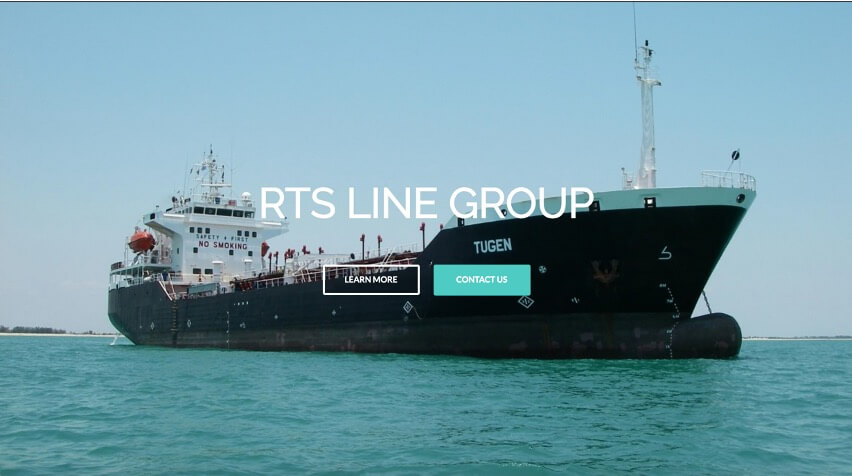
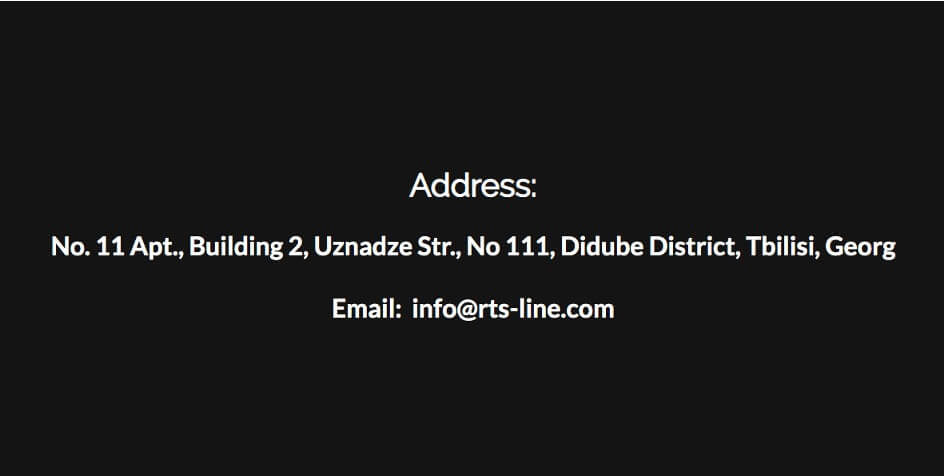
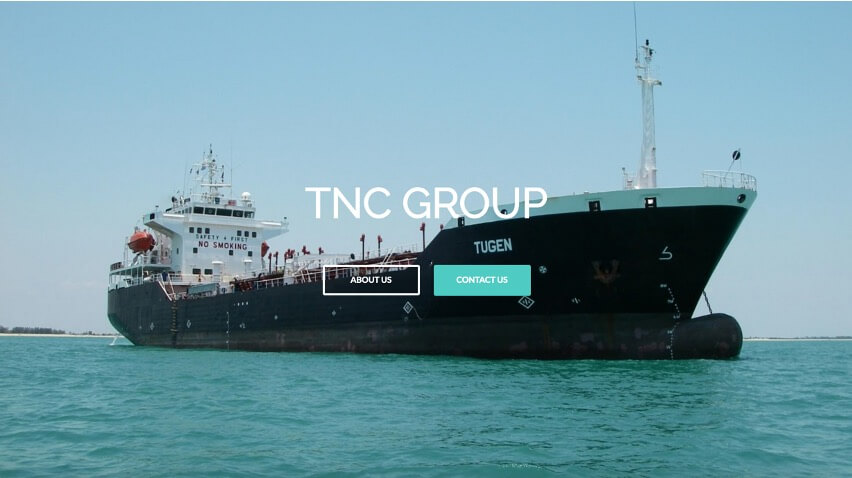
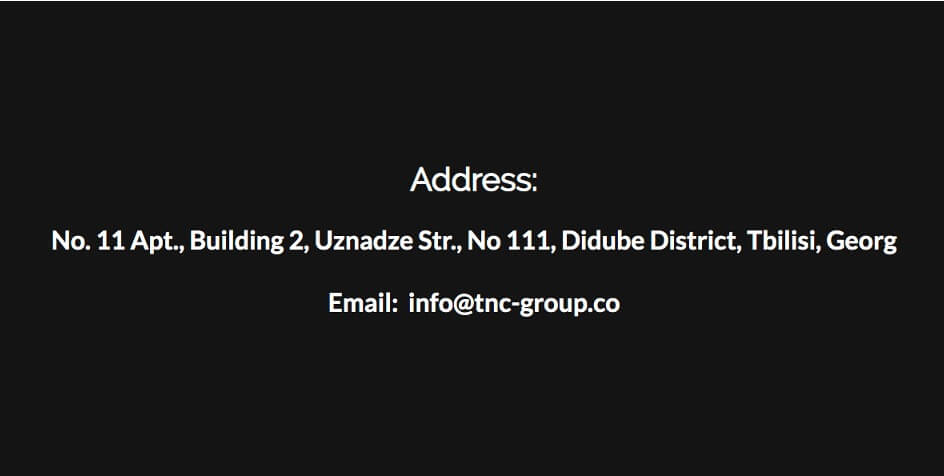
[Fig. 1-4: Home and Contact Us pages of the Russian Titan Shipping Line and TNC Group websites (as of Jun. 17, 2020)]
Interestingly, the source code for both websites hides additional shared contact information not visible on the main pages: an address in Tehran and three Iranian phone numbers (see Fig. 5). And both web domains are hosted on the same Iranian IP address.
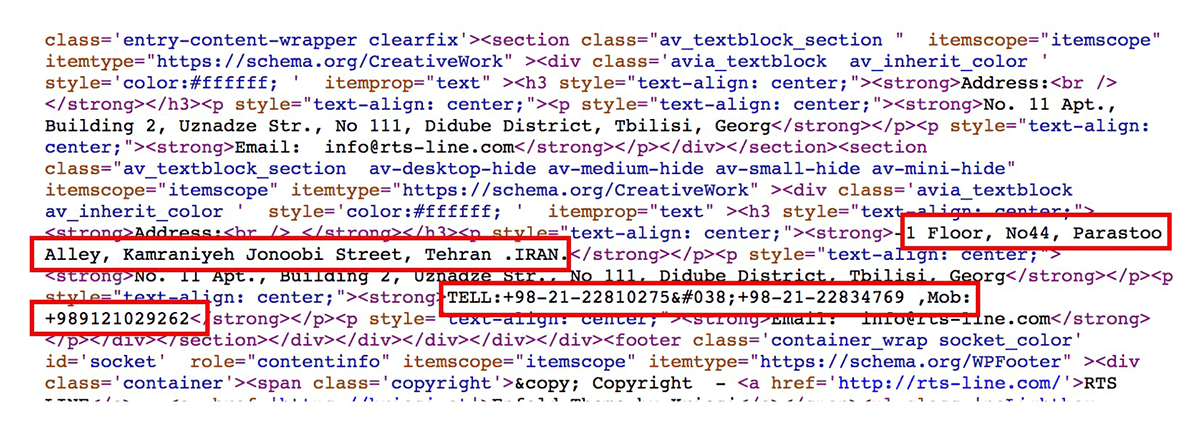
[Fig. 5: Excerpt from source code for Russian Titan Shipping Line Contact Us page. Iranian address and phone numbers are highlighted in red (as of Jun. 17, 2020)]
We already knew that Russian Titan Shipping Line and TNC Gulf shared the same owners, but these websites suggest an even closer relationship. These companies apparently operate out of the same location, and their websites were clearly created and administered by the same people.
Furthermore, the hidden Iranian contact information and hosting on a Tehran IP address suggest undisclosed ties to Iran. We find more evidence of this Iran connection when we take a closer look at these companies’ ownership and control.
Probable Proxy Shareholders
Emirati nationals Saleh Rida Zarouni and Hasan Ali Baloushi legally own both Russian Titan Shipping Line and TNC Gulf.
Over the past several years, Zarouni and Baloushi have owned dozens of other UAE companies in a variety of sectors, from electronics to general trading and apparel. In almost every case, Zarouni or Balousi served as the company’s 51 percent owner, with a non-Emirati holding the other 49 percent. This suggests that Zarouni and Baloushi are in business as local sponsors for foreign investors in Dubai.
Until recently, UAE law required that all commercial or industrial businesses have majority Emirati ownership. In order to operate in the UAE, foreign investors needed to partner with a local Emirati sponsor, who would legally own 51 percent of the company. However, the local sponsor wouldn’t necessarily control the business or profit from its earnings. Often, in exchange for a fee, sponsors would turn over full power of attorney to the 49 percent foreign co-owner, who really controlled the business.
Zarouni and Baloushi have co-owned companies with foreign investors from Afghanistan, Azerbaijan, Canada, Germany, India, Libya, the Netherlands, Nigeria, Saudi Arabia, Sudan, Pakistan, Russia, and Iran.
Russian Titan Shipping Line and TNC Gulf are clear exceptions to this pattern: instead of partnering with a foreign investor, Zarouni and Baloushi are the only owners. Only one other person appears publicly in connection with both of these companies: Captain Ahmed Asadpour.
Asadpour doesn’t give too much away on his LinkedIn profile. He’s bilingual in Persian and English. He has been certified as a Master Mariner with the International Maritime Organization since 1996. And he has held the same two positions concurrently since March 2008: Managing Director of Russian Titan Shipping Line, and Executive Managing Director of “TNC Group and Offshore.”
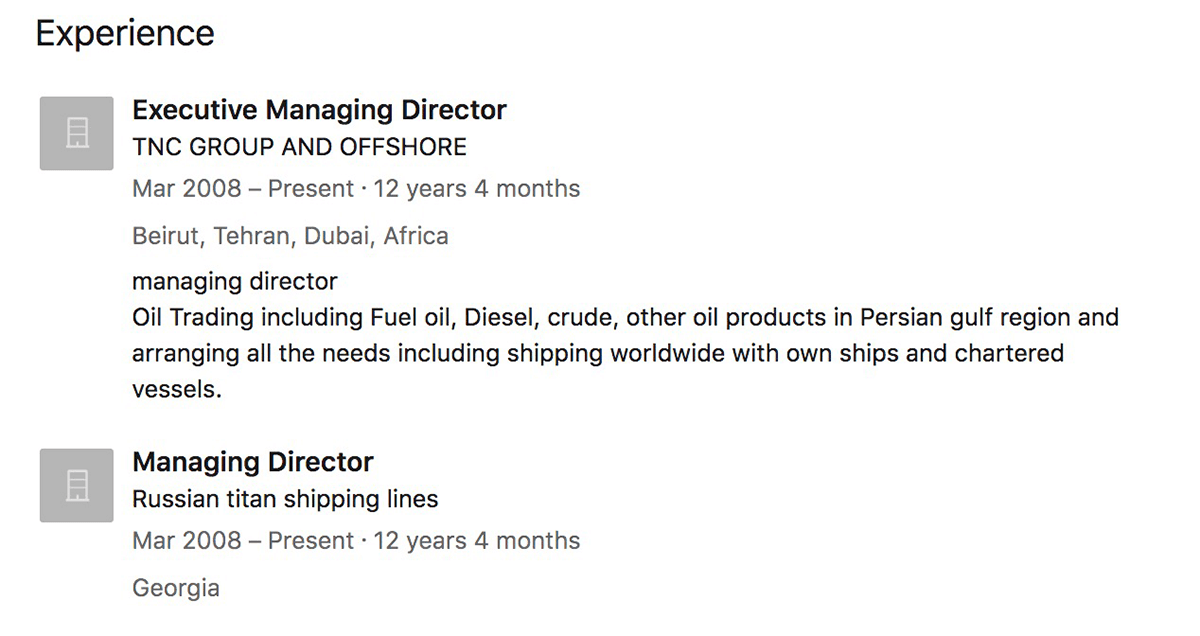
[Fig. 6: Excerpt from Ahmad Asadpour’s LinkedIn profile (as of Jun. 17, 2020)]
Zarouni and Baloushi might, in fact, own and control Russian Titan Shipping Line and TNC Gulf themselves. However, it seems more likely that they are holding shares on behalf of a foreign investor (or investors) who preferred to remain anonymous on official corporate records.
Asadpour is a strong candidate. He claims senior management positions with both companies and has a history in the maritime shipping industry. Furthermore, he may be Iranian, given his fluency in Persian and the Iranian ties to the company websites. This would fit with the pattern of Zarouni and Baloushi partnering with foreign nationals to facilitate their Dubai businesses.
Ties to the Al Aqilis
As we discussed in previous posts, the Emirati Al Aqili family has a history of supporting Iranian interests against international oil sanctions. The Al Aqilis show up over and over in connection to the Grace I, and we find them again with ties to Russian Titan Shipping Line.
In August 2016, a St. Kitts shell company called Grace Tankers Ltd. bought the Grace I. Panama documents revealed that Yaser Mohamed Saleh Al Aqili held power of attorney for Grace Tankers Ltd.
Grace Tankers Ltd. immediately hired Russian Titan Shipping Line as the Grace I’s ship manager. This timing alone suggests some relationship between Russian Titan Shipping Line, Grace Tankers, and the Al Aqilis.
We can confirm this connection with public records. When Russian Titan Shipping Line was serving as the Grace I’s ship manager, it provided a correspondence address at a Dubai P.O. Box. That same P.O. Box is the registered address of A.C.S. Trading LLC, a Dubai company 51 percent owned by Yaser Al Aqili.
Why consider a former ship manager?
Russian Titan Shipping Line was no longer the Grace I’s ship manager when the vessel was seized. It is, however, still relevant to our investigation of this sanctions evasion scheme.
We often find shipowners and ship managers collaborating on sanctions evasion and other illicit shipping schemes. Although the Grace I had a different ship manager at the time of its seizure, we have no reason to believe that was its first illicit oil shipment. The Grace I could have been moving Iranian oil for years, ever since Grace Tankers purchased it and Russian Titan Shipping Lines was ship manager. And, in fact, the further we explore the Grace I’s history, the more likely this seems.
For about six months in early 2014, the Grace I’s ISM manager was Khadija Ship Management Pte Ltd, based in Mumbai, India.
Last September, the U.S. Treasury’s Office of Foreign Assets Control (OFAC) sanctioned Khadija Ship Management as part of a massive shipping network “that is directed by and financially supports the Islamic Revolutionary Guard Corps-Qods Force (IRGC-QF) and its terrorist proxy Hizballah.” OFAC described how the Mehdi Group used Khadija Ship Management and other subsidiaries and shell companies to manage vessels involved in oil shipments. One of these vessels was the Grace I. Senior IRGC-QF officials, including Rostam Qasemi, oversaw the network and these illicit exports.
In other words, the Grace I had one owner and three ISM/commercial managers in the years leading up to its seizure. U.S. authorities have named two of those managers and the family in control of the owner in connection with large-scale Iranian sanctions evasion schemes benefitting the IRGC.
The third manager is Russian Titan Shipping Line.
It hasn’t been publicly named by authorities, but it was the Grace I’s ship manager at the same time its owner and ISM manager were known Iranian facilitators. And, as we’ve seen above, it too has connections to the Al Aqilis and Iran that we can prove with open source information.
Where do we go from here?
Multiple journalists who looked into the Grace I after its seizure identified Russian Titan Shipping Line and/or TNC Group as its owners. As we’ve shown, public records and other open source information can shed light on the nature of these opaque relationships.
Untangling the web of companies and facilitators surrounding the Grace I underscores the guidance U.S. authorities issued last month on how to combat illicit shipping and sanctions evasion:
If private sector entities are unable to reasonably identify the real parties in interest in a transaction, they may wish to consider performing additional due diligence to ensure it is not sanctionable or illicit.
This is the due diligence challenge facing the maritime shipping industry.
Getting Ahead of the Problem
The Grace I is not the only oil tanker operating on behalf of Iran — far from it. And many tankers are directly owned or controlled by Russian Titan Shipping Line, Iships Management, and other players involved in the Grace I’s illicit activity.
In our next post, we’ll show how an investigation like this can help us get ahead of the problem and proactively identify ships like the Grace I that are at high risk for engaging in sanctions evasion or other illicit activities.
Cover Image: www.vesselfinder.com